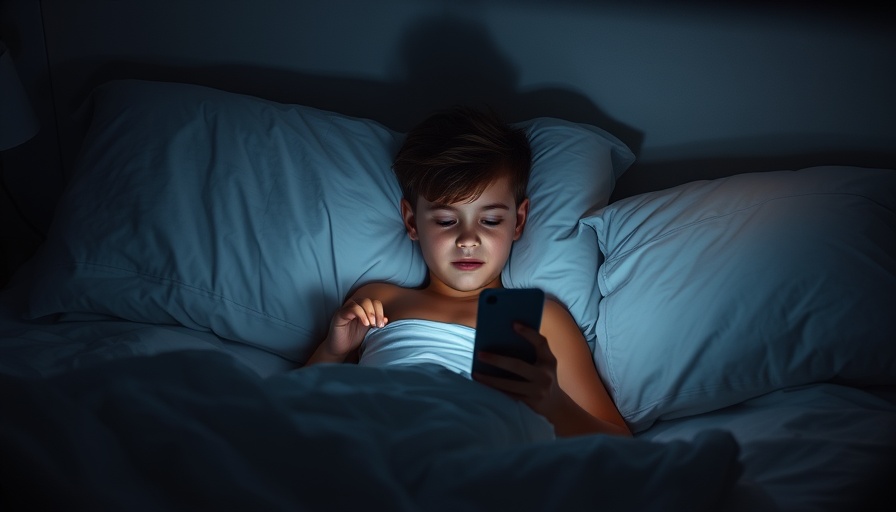
Understanding the Sleep Disruption from Screen Time
As our lives become increasingly intertwined with digital technology, many of us find ourselves scrolling through social media, watching videos, or checking emails right before bed. These comfortable bedtime rituals, often thought to help us unwind, might be doing more harm than good according to recent research. A study published in Frontiers in Psychiatry has highlighted significant links between pre-sleep screen time and poor sleep outcomes, especially among young adults.
The Statistics Speak for Themselves
Researchers discovered that one hour of screen time can spike the risk of insomnia by a staggering 59% and reduce overall sleep duration by 24 minutes. This speaks volumes about how our screen habits have crept into what should be our restful hours. Dr. Gunnhild Johnsen Hjetland, the study's lead author, emphasized that it’s not the specific activities, like scrolling or watching, that matter, but rather the sheer amount of time spent on screens that impacts sleep quality.
How Screen Use Disrupts Sleep
The study identified four main ways screens disrupt our slumber: notifications interrupt our rest, screen time replaces precious moments of sleep, engaging in screens heightens our alertness and delays the time taken to sleep, and blue light from screens interferes with our natural circadian rhythms. This information is particularly vital for young adults, like the students involved in the study, who often struggle with sleep and face long-term health effects from these disturbances.
Diving Deeper: The Science Behind Sleep and Technology
It’s worth noting that while the findings strongly suggest a correlation between screen use and disrupted sleep, they stop short of declaring a direct cause-and-effect relationship. Questions remain: Do those who struggle with insomnia naturally turn to screens as a way to cope, or does excessive screen time directly lead to sleeplessness? More research is needed to unearth these intricacies, but in the meantime, practical steps can be taken.
How to Optimize Sleep: Practical Tips for Better Sleep Hygiene
If you suspect that your nighttime screen habits are encroaching upon your sleep quality, consider adopting these simple changes in your routine:
- Establish a Screen-Free Zone: Make your bed a sanctuary for sleep by keeping devices out of the bedroom.
- Time Your Screen Use: Aim to minimize screen time at least 30-60 minutes before bed.
- Adjust Device Settings: If you must use your devices, disable notifications to prevent disruptions from incoming alerts.
- Create a Wind-Down Playlist: Substitute screen time with calming activities, like reading or listening to soothing music.
Future Trends: The Growing Concern Over Sleep Health
As awareness of sleep health grows, experts predict that more individuals will prioritize sleep hygiene in their routines. With mental well-being increasingly linked to quality sleep, being conscious of our habits might shift from a trend to a necessity. As we navigate this digital age, staying informed about the implications of our lifestyle choices will empower us to make healthier decisions.
Common Misconceptions About Screens and Sleep
It’s an all-too-common belief that the specific type of content consumed affects sleep, but the current findings suggest otherwise. The confusion lies in the comfort many find in screen time. Whether it’s calming podcasts or stimulating video games, the result is often the same: disrupted rest. Shifting this mindset could be crucial for improving sleep hygiene.
Your Sleep Health Matters
Understanding the impact of screen time on your night’s rest is a step toward reclaiming your sleep health. By implementing just a few simple changes, you might find yourself waking up more refreshed and ready to seize the day. Remember, good sleep is not just a luxury; it’s essential for your overall well-being.
So, if you’re having trouble sleeping, reflect on your screen habits—your rest could depend on it!
 Add Row
Add Row  Add
Add 




Write A Comment